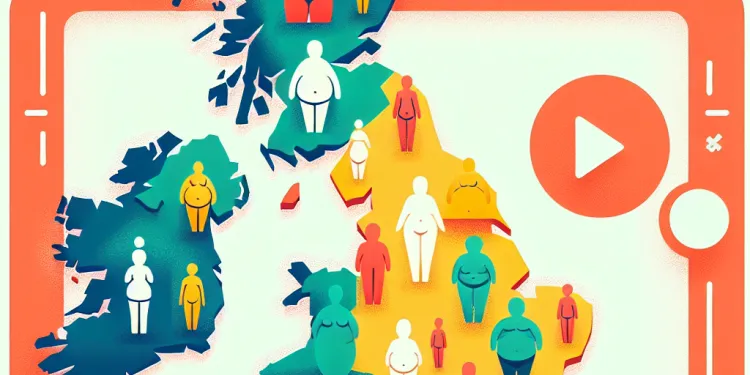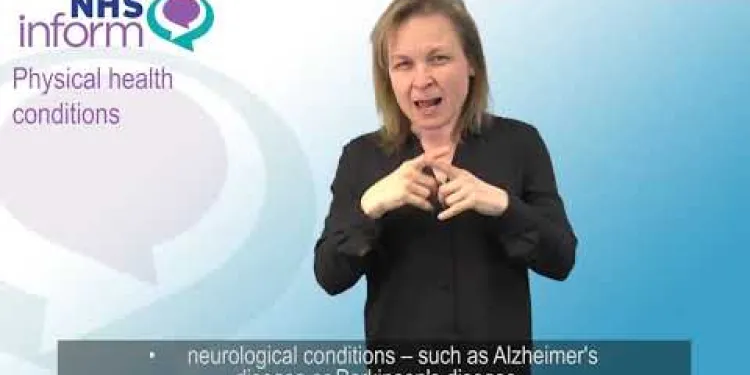
Find Help
More Items From Ergsy search
-

What causes obesity?
Relevance: 100%
-

Obesity
Relevance: 81%
-

How is obesity measured?
Relevance: 65%
-

Is childhood obesity a concern in the United Kingdom?
Relevance: 65%
-

How can obesity be prevented?
Relevance: 65%
-

Is childhood obesity a concern in the United Kingdom?
Relevance: 63%
-

Is obesity more prevalent in certain regions of the UK?
Relevance: 63%
-

Can genetics influence obesity?
Relevance: 63%
-

What health risks are associated with obesity?
Relevance: 62%
-

What treatments are available for obesity?
Relevance: 62%
-

What are the current statistics on childhood obesity in the UK?
Relevance: 61%
-

What is the impact of obesity on mental health?
Relevance: 60%
-

Are there any societal factors that contribute to obesity?
Relevance: 59%
-

Study Finds Alarming Increase in Childhood Obesity Rates Post-Pandemic
Relevance: 57%
-

What role does diet play in managing obesity?
Relevance: 57%
-

How does obesity affect bowel cancer rates?
Relevance: 57%
-

Do weight loss jabs work for all types of obesity?
Relevance: 56%
-

What impact has the sugar tax had on obesity rates?
Relevance: 56%
-

What role do sugary drinks play in obesity?
Relevance: 56%
-

How important is physical activity in preventing obesity?
Relevance: 56%
-

What causes thrombosis?
Relevance: 52%
-

What causes Type 2 Diabetes?
Relevance: 51%
-

What causes asthma?
Relevance: 49%
-

What causes psoriasis?
Relevance: 48%
-

What causes chronic kidney disease?
Relevance: 47%
-

What causes heart failure?
Relevance: 46%
-

What causes Carpal Tunnel Syndrome?
Relevance: 45%
-

What causes BPH?
Relevance: 44%
-

What causes high blood pressure?
Relevance: 44%
-

What causes obstructive sleep apnea?
Relevance: 43%
-

What Causes Erectile Dysfunction (ED) - Disease or Symptom - NHS A to Z - Dr Gill
Relevance: 39%
-

What causes autism?
Relevance: 38%
-

Does sugar cause addiction?
Relevance: 36%
-

Causes of a sore throat
Relevance: 35%
-

What causes shingles?
Relevance: 35%
-

What causes hypotony?
Relevance: 35%
-

What causes tinnitus?
Relevance: 35%
-

What causes shingles?
Relevance: 35%
-

BSL - Causes of insomnia
Relevance: 35%
-

What causes appendicitis?
Relevance: 34%
Understanding the Causes of Obesity
Obesity is a complex and multifaceted health issue that affects many people in the United Kingdom. It is characterized by excessive body fat accumulation, which can lead to various health problems. The causes of obesity can be grouped into several categories including lifestyle, environmental, and genetic factors.
Lifestyle Factors Contributing to Obesity
One of the primary lifestyle contributors to obesity is poor diet. Consumption of high-calorie, nutrient-poor foods such as fast food, sugary drinks, and snacks leads to increased caloric intake without providing essential nutrients. Coupled with this is a lack of physical activity. Many individuals in the UK lead sedentary lifestyles, often due to desk-bound jobs or excessive screen time, which contributes to weight gain as calories consumed aren't burnt off effectively.
Environmental Influences on Obesity
The environment plays a significant role in shaping people’s eating and activity habits. The availability of and access to healthy foods are limited in some areas, making it more challenging to maintain a healthy diet. The prevalence of food marketing and promotions for unhealthy foods also influences choices. Moreover, urban planning in many UK cities lacks adequate infrastructure for walking or cycling, reducing opportunities for activity.
Genetic and Biological Factors
Genetics also contributes to obesity, as certain genes may affect appetite, metabolism, and body-fat distribution. While not everyone with a genetic predisposition to obesity will become obese, these factors can make it more difficult for some individuals to manage their weight effectively. Hormonal imbalances, such as those affecting the regulation of appetite and energy storage, can also play a role in obesity.
Socioeconomic Status and Obesity
Socioeconomic status is another determinant of obesity rates in the UK. People from lower socioeconomic groups often face barriers that lead to unhealthy lifestyles. These include limited financial resources for purchasing healthy food, reduced access to health education, and fewer opportunities for recreational physical activities. Stress and mental health issues, which may be exacerbated by socioeconomic difficulties, can also contribute to weight gain through emotional eating.
Conclusion
Addressing obesity requires a comprehensive approach that includes personal lifestyle changes, along with societal efforts to create supportive environments. Interventions should focus on improving diet and promoting physical activity, while policies must aim to reduce socioeconomic disparities and enhance public health education. Understanding these causes of obesity is essential for individuals and policymakers to tackle the obesity epidemic effectively in the UK.
Understanding Why People Become Overweight
Being overweight means having too much body fat. This can cause health problems. Many people in the United Kingdom are overweight. It's a hard problem because there are many reasons why people gain too much weight. These reasons include how we live our lives, where we live, and our genes.
How Lifestyle Choices Affect Weight
One big reason people gain weight is because of what they eat. Eating a lot of fast food, sugary drinks, and snacks can make us gain weight. These foods have a lot of calories but not many good nutrients. Also, not moving around enough can lead to weight gain. Many people in the UK sit a lot because of their jobs or watching screens, and this means they don't burn off the food they eat.
How Our Environment Affects Weight
Where we live can change how we eat and move. Some places do not have many healthy foods to buy, so it's hard to eat well. There are lots of ads for unhealthy foods too. Also, cities might not have good paths for walking or cycling, so it's harder to be active.
How Genes and Biology Affect Weight
Our genes can make it easier or harder to gain or lose weight. Some people have genes that make them feel hungrier or store more fat. Hormones, which are chemicals in our bodies, can also make it hard to keep a healthy weight.
How Money and Jobs Affect Weight
People who don't have a lot of money might find it harder to stay healthy. Buying healthy food can be expensive. They might not have parks or places to exercise. Also, stress from money problems can make people eat more for comfort.
What Can Help
To help people stay at a healthy weight, we need to work together. People can try to eat better and move more. Communities can make it easier to be active and buy healthy foods. We also need to teach people more about staying healthy. By knowing why people gain weight, everyone can help make it easier to be healthy in the UK.
Frequently Asked Questions
What is obesity?
Obesity is a medical condition characterized by excessive body fat that may impair health. It is typically defined by a Body Mass Index (BMI) of 30 or above.
What causes obesity?
Obesity is caused by an imbalance between calories consumed and calories burned. Factors contributing to obesity include genetics, lifestyle choices, metabolism, environment, and certain health conditions.
How do genetics influence obesity?
Genetics can affect how the body stores fat, regulates appetite, and metabolises foods, increasing the likelihood of obesity if family members are also affected.
Can lifestyle choices lead to obesity?
Yes, poor diet choices, lack of physical activity, and sedentary behaviour are major lifestyle factors that contribute to obesity.
Does metabolism play a role in obesity?
Metabolism can influence weight gain, but it is less commonly a cause of obesity. Factors such as muscle mass and calorie-burning efficiency play a role in how the body uses energy.
What environmental factors contribute to obesity?
Access to high-calorie foods, limited availability of healthy options, urbanisation, and lack of safe areas for physical activity are environmental factors that can lead to obesity.
Are psychological factors linked to obesity?
Yes, stress, emotional eating, and mental health conditions such as depression can contribute to weight gain and obesity.
Can some medical conditions lead to obesity?
Certain medical conditions, like hypothyroidism, polycystic ovary syndrome (PCOS), and Cushing's syndrome, can contribute to weight gain and obesity.
How does medication contribute to obesity?
Some medications, like antidepressants, antipsychotics, and corticosteroids, can increase appetite or slow down metabolism, leading to weight gain.
What is the role of diet in causing obesity?
A diet high in calories, fats, sugars, and processed foods contributes to weight gain and obesity. Large portion sizes and frequent consumption of fast food can also be factors.
How can physical inactivity cause obesity?
Physical inactivity leads to fewer calories being burned, resulting in a surplus that the body stores as fat, contributing to obesity.
Is obesity more prevalent in certain age groups?
Obesity can affect any age group, but it is increasingly prevalent in children and adolescents due to poor diet and decreased physical activity.
How does sleep affect obesity?
Lack of sleep can disrupt hormones that control appetite, increase stress levels, and lead to unhealthy eating, all contributing to obesity.
Can socioeconomic factors influence obesity?
Yes, lower socioeconomic status can limit access to healthy foods and recreational activities, contributing to higher obesity rates.
What is the impact of obesity on health?
Obesity increases the risk of numerous health issues, including type 2 diabetes, heart disease, stroke, certain cancers, and joint problems.
What is Obesity?
Obesity means being very overweight. It can make you unhealthy.
Here are some tips to learn more:
- Look at pictures to help understand what obesity is.
- Ask a grown-up to explain or read with you.
- Use apps that read text out loud.
Obesity means having too much body fat. This can make you unhealthy. We say someone is obese if their Body Mass Index (BMI) is 30 or more.
If you find reading hard, you can try using a finger or ruler to follow each line of text. You can also use tools like text-to-speech apps that read the words out loud for you. This can make it easier to understand.
Why do people become very overweight?
People can become very overweight because they eat too much food or they don't move enough. Sometimes, people eat a lot of food that is not healthy like sweets and fast food.
It can also happen because of family habits. If parents eat lots of unhealthy food, kids might do the same.
Sometimes, people can become overweight because of their health. A doctor can help with this.
Here are some things you can do:
- Eat more fruits and vegetables.
- Move around more by playing or walking.
- Ask a family member or a teacher for help.
Being very overweight is called obesity. It happens when you eat more food than your body uses for energy. This extra food becomes fat. Things that can make someone overweight include:
- Genes from your family
- What you eat and how much you move
- How your body uses food
- Where you live and what is around you
- Some health problems
How do genes affect being overweight?
Genes are like instructions in our bodies. They can change how our body stores fat, feels hungry, and uses food. If your family has these gene changes, you might have a higher chance of being overweight, too.
Can the way we live make us very overweight?
Yes, eating unhealthy food, not moving enough, and sitting too much can make people put on too much weight.
Does metabolism affect being overweight?
Our metabolism helps us use the food we eat. When it works well, our body gets energy from food. If it doesn't work well, it can be harder to stay at a healthy weight.
If you want to learn more, you can:
- Ask a doctor or teacher for help.
- Watch a video about metabolism.
- Read a children's book on food and health.
Your body’s metabolism helps decide if you gain weight, but it usually doesn’t cause people to become very overweight. Things like how strong your muscles are and how well your body burns food for energy are important in how your body uses energy.
If you have trouble reading this, you can try using tools like text-to-speech to hear it read aloud or use a reading ruler to focus on one line at a time.
What things around us can make people gain too much weight?
There are several reasons why people may become overweight. These include:
- Having lots of high-calorie food around, like fast food or candy.
- Not having many healthy foods to choose from.
- Living in cities where there is more junk food.
- Not having safe places to play or exercise.
Here are some things that can help:
- Using pictures to understand food choices better.
- Setting small goals for healthy eating and exercise.
- Asking an adult for help to find safe places to play.
Do feelings and thoughts affect weight gain?
Yes, feeling stressed, eating when sad or upset, and having conditions like depression can make people gain weight and become very overweight.
Can some illnesses make people gain a lot of weight?
Some health problems can make people gain weight. These problems include:
1. Hypothyroidism: When your thyroid is not working well.
2. Polycystic Ovary Syndrome (PCOS): A problem with your ovaries.
3. Cushing's Syndrome: When your body makes too much of a hormone called cortisol.
These problems can make it hard to keep a healthy weight.
How can medicine make you gain weight?
Some medicines, like those for feeling sad or worried, can make you hungrier or make your body slower at using energy. This can make you gain weight.
How can what we eat make us gain too much weight?
Eating a lot of food with lots of calories, fats, and sugars can make you gain weight. Eating too much fast food is not good for your body. Try not to eat too much or eat large portions. This can help keep you healthy.
How does not moving enough make you gain weight?
When you don't move around a lot, your body doesn't use as much energy. That means any extra food you eat can turn into fat, making you gain weight.
Here are some things that might help you:
- Try to do some exercise every day, like walking or playing outside.
- Ask an adult to help you plan fun activities to keep you moving.
- Remember to eat healthy foods like fruits and vegetables.
When we don't move much, our bodies don't use up many calories. This means extra calories turn into fat and can make us overweight.
Are some age groups more likely to be overweight?
Let's think about who might be more likely to gain extra weight. Do you think older people, teens, or kids are more often overweight?
If reading is hard, you can use tools like audiobooks to listen to the information. You can also ask someone to read with you to help understand the words.
Being very overweight is called obesity. Anyone can have obesity, but more kids and teenagers are getting it. This happens because they eat too much unhealthy food and don't move around enough.
How does sleep affect being overweight?
Getting enough sleep is important for staying healthy. When you do not sleep enough, it can make you feel very hungry. This might make you eat more than you need to.
If you do not rest well at night, you might want to eat more junk food. Junk food is things like sweets, chips, and soda. Eating too much of these foods can make it easy to gain weight.
Tools to help you sleep better:
- Try to go to bed at the same time every night.
- Make your bedroom quiet and dark.
- Avoid looking at screens, like phones or tablets, before bed.
If you don't get enough sleep, it can upset the balance of hormones that make you feel hungry or full. It can also make you feel more stressed out. All of this might make you eat unhealthy foods and could make you gain weight. Try to get good sleep, relax with deep breaths, and eat healthy meals.
Can money and living situations make people gain too much weight?
Yes, people with less money might find it harder to get healthy food and to do fun exercise. This can make them more likely to gain too much weight.
How does being very overweight affect health?
Being very overweight is called obesity. It can make people feel unwell in different ways. Here are some things that can happen:
- Obesity can make it hard to breathe and move.
- It can make your heart work harder.
- People might feel tired or have less energy.
- It can cause problems like diabetes.
Eating healthy foods, exercising, and talking to a doctor can help. There are also apps and community groups that can support you in being healthy.
If someone is very overweight, it can cause health problems. These problems can include:
- Getting sick with type 2 diabetes
- Having heart problems
- Having a stroke
- Getting some kinds of cancer
- Having sore joints
Remember, staying healthy can help you feel better! Eating healthy food, doing fun exercises, and talking to a doctor can help. You can also use tools like picture charts or apps to track healthy habits.
Useful Links
This website offers general information and is not a substitute for professional advice.
Always seek guidance from qualified professionals.
If you have any medical concerns or need urgent help, contact a healthcare professional or emergency services immediately.
- Ergsy carfully checks the information in the videos we provide here.
- Videos shown by Youtube after a video has completed, have NOT been reviewed by ERGSY.
- To view, click the arrow in centre of video.
- Most of the videos you find here will have subtitles and/or closed captions available.
- You may need to turn these on, and choose your preferred language.
- Go to the video you'd like to watch.
- If closed captions (CC) are available, settings will be visible on the bottom right of the video player.
- To turn on Captions, click settings .
- To turn off Captions, click settings again.
More Items From Ergsy search
-

What causes obesity?
Relevance: 100%
-

Obesity
Relevance: 81%
-

How is obesity measured?
Relevance: 65%
-

Is childhood obesity a concern in the United Kingdom?
Relevance: 65%
-

How can obesity be prevented?
Relevance: 65%
-

Is childhood obesity a concern in the United Kingdom?
Relevance: 63%
-

Is obesity more prevalent in certain regions of the UK?
Relevance: 63%
-

Can genetics influence obesity?
Relevance: 63%
-

What health risks are associated with obesity?
Relevance: 62%
-

What treatments are available for obesity?
Relevance: 62%
-

What are the current statistics on childhood obesity in the UK?
Relevance: 61%
-

What is the impact of obesity on mental health?
Relevance: 60%
-

Are there any societal factors that contribute to obesity?
Relevance: 59%
-

Study Finds Alarming Increase in Childhood Obesity Rates Post-Pandemic
Relevance: 57%
-

What role does diet play in managing obesity?
Relevance: 57%
-

How does obesity affect bowel cancer rates?
Relevance: 57%
-

Do weight loss jabs work for all types of obesity?
Relevance: 56%
-

What impact has the sugar tax had on obesity rates?
Relevance: 56%
-

What role do sugary drinks play in obesity?
Relevance: 56%
-

How important is physical activity in preventing obesity?
Relevance: 56%
-

What causes thrombosis?
Relevance: 52%
-

What causes Type 2 Diabetes?
Relevance: 51%
-

What causes asthma?
Relevance: 49%
-

What causes psoriasis?
Relevance: 48%
-

What causes chronic kidney disease?
Relevance: 47%
-

What causes heart failure?
Relevance: 46%
-

What causes Carpal Tunnel Syndrome?
Relevance: 45%
-

What causes BPH?
Relevance: 44%
-

What causes high blood pressure?
Relevance: 44%
-

What causes obstructive sleep apnea?
Relevance: 43%
-

What Causes Erectile Dysfunction (ED) - Disease or Symptom - NHS A to Z - Dr Gill
Relevance: 39%
-

What causes autism?
Relevance: 38%
-

Does sugar cause addiction?
Relevance: 36%
-

Causes of a sore throat
Relevance: 35%
-

What causes shingles?
Relevance: 35%
-

What causes hypotony?
Relevance: 35%
-

What causes tinnitus?
Relevance: 35%
-

What causes shingles?
Relevance: 35%
-

BSL - Causes of insomnia
Relevance: 35%
-

What causes appendicitis?
Relevance: 34%


